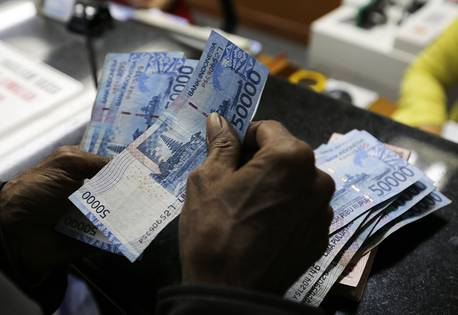Singapore,MINA — The recent free-fall of the rupiah could have led to jitters among investors and Singapore companies exposed to Indonesia, but analysts say the country remains attractive for businesses – in particular, startups – to venture into on the back of strong fundamentals Business Times reported,
More Singapore startups are also actively looking at opportunities in Indonesia, with about 30 of them currently seeking help from Enterprise Singapore to enter the market – a number that the government agency said has been ramped up in the last 18 months.
“Coming into Indonesia is both risk and opportunity. It is a large market with demographics in its favour, but the risk is mainly on the financial depth of the market – currency is just one of them,” said UOB’s Indonesia economist Enrico Tanuwidjaja.
Also Read: Saudi Arabia Wins Bid to Host World Expo 2030
Despite the risks involved, he noted a “sustained momentum” in interest from global investors and startups to enter the Indonesia market in the past few years through joint ventures with domestic partners.
This is because key ingredients to spur innovation in Indonesia have remained intact, with a market seen to be large enough to allow more players in the innovation space, said Khairul Anwar, regional group director (Jakarta), Enterprise Singapore.
These include a young and growing population of 260 million with half below of them below 25 years old, growing demand to get products and services across the sprawling archipelago, as well as cash-flushed firms looking to deploy their capital into startups.
Also Read: 148 Products from Indonesia Promoted at Sarawat Superstore Jeddah
Four unicorns
With four unicorns – Go-Jek, Tokopedia, Traveloka and Bukalapak – in its bag, Indonesia today boasts a “lively” startup scene that has rekindled a spirit of entrepreneurship and drawn interest from both major domestic and international players, said Mr Anwar. A unicorn is a startup with a valuation of US$1 billion.
Investments have skyrocketed from US$50 million five years ago to US$3 billion in the first half of 2017
For Singapore startups to seize opportunities in Indonesia, Mr Anwar identified five in-demand areas: e-commerce services, logistics and fulfilment, fintech, e-health services, and deep tech.
Also Read: Packaging Industry Supports Halal Ecosystem
With the rise of e-commerce brings the need for related services that attract more SMEs and consumers to buy and sell online, such as fraud detection, e-commerce on-boarding and digital marketing.
But the e-commerce market remains “highly fragmented and under- developed”, he said. The lack of locally-developed solutions presents an opportunity for Singapore solutions to be integrated with existing Indonesian service providers and platforms.
The growth of e-commerce has also created new issues in terms of logistics and fulfilment due to Indonesia’s geography and low infrastructure provision.
“Last-mile fulfilment is a crowded field with low profitability. It is better to work with existing distribution networks and provide the platform, algorithms, services and financing, rather than to own the trucks directly,” advised Mr Anwar.
Also Read: Indonesia-Japan Agree on Energy Transition Cooperation
“We should work on our strengths in cross-border logistics and Singapore’s strength as a sourcing, distribution and logistics hub to serve Indonesia cost effectively.”
Fintech in the form of e-payments is another area that local startups can look at as people need to pay for e-commerce and there is still no clear winner in the market, he added, urging Singapore businesses to explore being a gateway or integrator instead of creating a new form of e-payment, due to the difficulty of obtaining required licenses for foreign entities.
But despite the abundance of opportunity, Indonesia remains a tough nut to crack, noted analysts.
As an emerging market, the country comes with risks as seen in the latest currency crisis, where the rupiah fell to its lowest level since the Asian Financial Crisis in 1998.
Also Read: Dubai Expo 2020 Holds Special Event for Palestine
Mitigated through financial products
UOB’s Mr Tanuwidjaja said that the currency challenge can be mitigated through financial products such as hedging and options to take into account future movements.
Joongshik Wang, EY Asean Digital Strategy – M&A Leader, also noted that a depreciating rupiah might not always work against startups looking to invest in Indonesia.
Also Read: Indonesia Increases Excise on Tobacco Products by 2022
“With the falling rupiah, market entry cost will be lower for startups to consider an aggressive approach to entering the market,” he said.
“But they should be mindful that exiting may become more expensive, as valuation is dependent on the assets’ stability and visibility in the country.”
Singapore startups currently in Indonesia say they are keeping a close watch on the situation, but most are not overly concerned as risks are part and parcel of venturing into emerging markets.
Darius Cheung, CEO of 99.Co, said some steps that the business has taken to manage the currency crisis was to keep cash mainly in Singdollar or US dollar, and to change only when needed. He suggested that startups lock as much of their expense contracts in rupiah, while locking in as much revenue in either US dollar or Singdollar as possible.
Also Read: Indonesia to Become the Center of Sharia Economy in 2024
Indonesia accounts for half of 99.co’s business, and it is growing 20-25 per cent each quarter.
Mr Cheung said the political uncertainty surrounding the Indonesian elections due next year is also something to look at. “It is hard to predict what can happen. We generally have to be ‘switched on’ and strategise around it,” he said. “For example, we are currently focused more on the ‘own-stay’ segment of properties because many investors are holding off buying luxury property until elections are over.”
Carlson Lau, CEO and co-founder of co-working space operator Cocowork (formerly EV Hive), acknowledged that macroeconomic risks “exist in any country” and are often beyond the control of businessmen.
Cocowork is Indonesia’s largest co-working space operator, with 21 co-working spaces and 30,000 square metres of space.
Also Read: Indonesia to Host World Tourism Day 2022
Mr Lau’s advice for startups looking to successfully venture into Indonesia regardless of headwinds is to forge strong local partnerships to scale and customise products to fit the market.
“What can be controlled is having a great product, a strong distribution network, good local partners and a committed team driving the business – and any business could ride out economic cycles,” he said.
Enterprise Singapore’s Mr Anwar emphasised that if startups “tread wisely”, the upside of investing in Indonesia can be very high. With more unicorns expected to spring from Indonesia in the next few years, local startups need to catch this wave.
“Singapore companies cannot be absent from this market if they are serious about the startup and tech sector, and be serious about growing big,” he added. (T/RS5/RS1)
Also Read: Chinese Companies Begin to Explore Lithium in Afghanistan
Mi’raj Islamic News Agency (MINA)
Also Read: European Union Explores Cooperation in Sustainable Palm Oil Production in Riau




























 Mina Indonesia
Mina Indonesia Mina Arabic
Mina Arabic